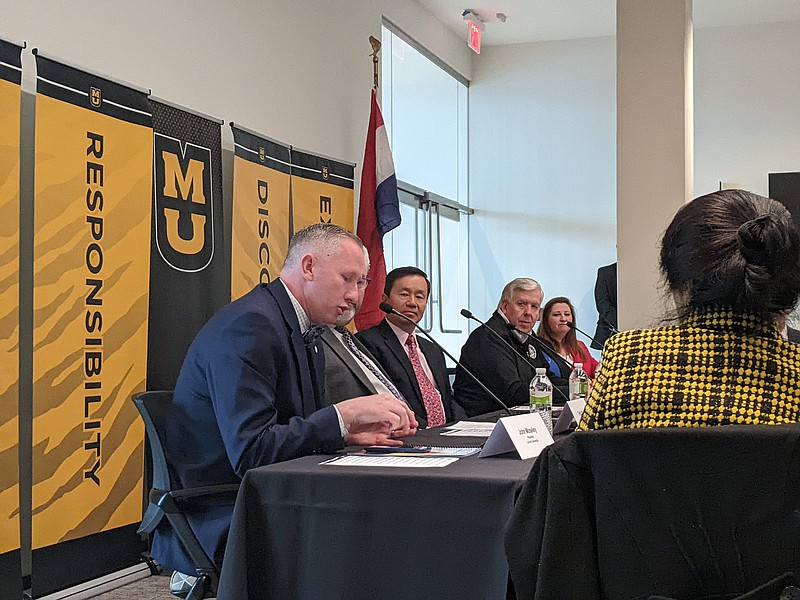Gov. Mike Parson and higher education leaders from around Mid-Missouri are hoping to preserve the partnerships forged out of the COVID-19 pandemic.
Parson hosted his latest higher education and workforce roundtable discussion Friday at the University of Missouri, inviting Lincoln University President John Moseley, MU officials, state lawmakers and area career center directors to the table.
During the visit, Parson laid out his plans to invest in workforce development and higher education, as well as broadband, health care, mental health and water infrastructure, and encouraged the higher education and workforce development leaders to maintain their relationships with the state, as well as each other.
"Before the pandemic, we were starting to reach out to universities, and we were talking about universities, community colleges, K-12 working together for the workforce development piece," Parson said. "And then through the pandemic, we were forced to become even closer.
"We now know how important those relationships were during the pandemic, there's no reason we can't build off that and make this better to keep those communication lines open in all areas," he said.
Parson described federal funds flowing into the state as a once-in-a-lifetime opportunity to make long-term investments that improve the future for Missourians.
He said he wants to develop a foundation this year and build on the proposed investments with the established relationships into the future.
"We're going to make sure that this money is going where it needs to go, and we're going to get something out of it," Parson said. "I will be the best partner that I can possibly be at the state level."
Parson said his first priority is investing in Missouri residents by supporting services they can access.
Zora Mulligan, state commissioner of higher education, said Parson's administration is taking a comprehensive approach to workforce development.
She said factors like lack of broadband and childcare access are major barriers to workforce development and adults engaging in higher education.
"I can't do that by myself, I've got to have you guys," Parson told the roundtable participants. "I've got to have you believing what I'm believing."
The governor's proposed budget includes a 5.4 percent increase to core appropriations for all public colleges and universities in the state, which costs roughly $51.6 million.
The proposed budget also includes funding for capital improvement projects at all public colleges and universities.
Each appropriation requires the college or university to match the state appropriation dollar for dollar.
Parson said he is expecting the higher education institutions to be fully committed and investing their own resources.
"There's some exciting stuff going, whether you go to a university in the state or the community colleges," Parson said. "There's going to be some tremendous expectations on them to do more, and we're going to push for that every day. Whatever we're going to do, whatever we're going to invest in, we want return on that money, and we want the data to show that it's working."
Moseley said it's been beneficial to have the governor's support and developing partnerships with state and local officials will be important for some of the initiatives Lincoln University wants to get off the ground.
Parson has proposed a $20 million state appropriation for Lincoln to build a $40 million Health Sciences and Crisis Center.
The 40,000-square-foot facility would house Lincoln's nursing, pre-med and STEM programs, as well as the newly proposed Security Science Institute, which includes the LU Law Enforcement Training Academy and certification and licensing programs in cybersecurity, emergency management, geospatial information services and criminal justice.
"Education, we believe, not only changes the lives of our students but for generations after them," Moseley said. "And so with the governor's proposed budget, the projects that would benefit Lincoln we think would have a significant impact on our future enrollment and make Lincoln a place that a lot more students want to come and study."
MU President Mun Choi said he made a promise to strengthen Mizzou's partnership with Lincoln University, specifically in the area of agriculture research and extension.
Lincoln and MU are Missouri's only land-grant institutions, which means they receive federal and state funds specifically for agriculture research and extension.
Moseley said the Lincoln and MU extension offices work together on a number of projects -- some Lincoln researchers lead and some Mizzou researchers lead.
"Strengthening that relationship benefits the entire state," Moseley said. "Right now, Lincoln serves 47 counties through extension, so partnering with MU gives us a chance to maybe expand that reach a little greater."
Lincoln and MU have different missions, Moseley said, but by partnering together, the two can serve the state, Midwest and country in a greater capacity.
"We are excited about what we believe to be a great time to be at Lincoln University," Moseley said.
He also said he appreciated Choi being one of the first to offer help when Moseley began leading Lincoln.
Parson encouraged the higher education and workforce leaders to maintain their partnerships, as well as the hustle and energy spurred by the pandemic.
"Think of what we did when we communicated with one another and what we've done in a year's time to fight a pandemic," Parson said. "Imagine what you can do without the pandemic."
"It's going to be a new plan in the way we all operate, and it's going to be good for us," he said.

